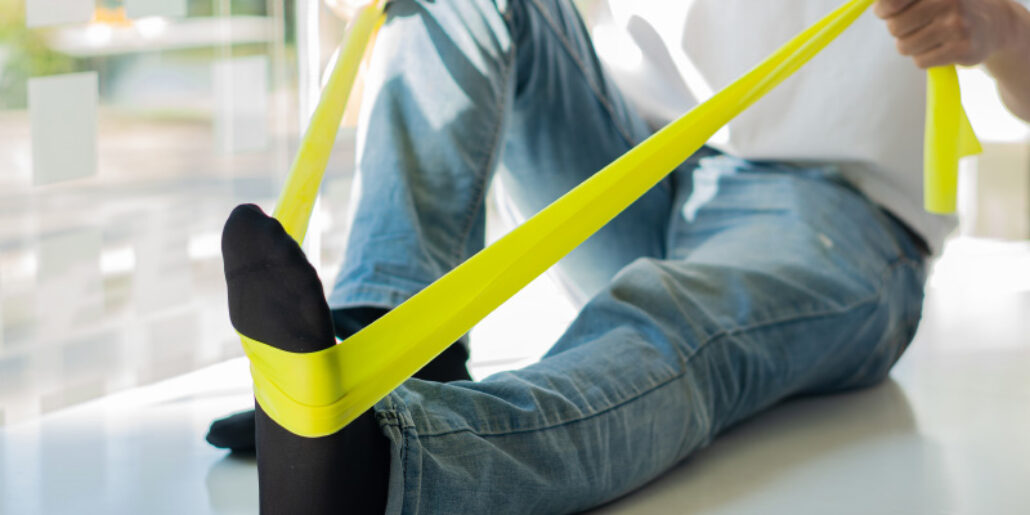MCL stands for medial collateral ligament. It’s a ligament on the inside of the knee. Like all ligaments, the MCL is a strong, tough band of tissue that connects one bone to another bone. Physical Therapist, Josh Feeney talks about the recovery time for a MCL tear and whether surgery is needed.
What is an MCL tear?
Although an MCL tear can happen to anyone, athletes are most at risk. It can happen when an athlete suddenly twists or changes direction. It can also happen when something hits the athlete’s knee. Sports like football, basketball, rugby, volleyball, and skiing can result in MCL tears. MCL tears are the most common knee ligament injury.
MCL tears are classified as “partial” or “complete.” In a partial MCL tear, the ligament has torn partway, but some of the ligament’s fibers remain attached. In a complete tear, the ligament has snapped, fully separating into two pieces.
What are the symptoms of an MCL tear?
Symptoms of an MCL tear include:
- Pain and tenderness in the knee
- Stiffness and swelling in the knee
- A feeling of instability, as if your knee might give out
What is a torn MCL treatment and recovery time?
If you suspect you’ve torn or damaged your MCL, the first thing to do is to get it evaluated by an orthopedic specialist. Your provider will conduct a physical exam and may order imaging tests, like an X-ray, ultrasound, or MRI, to confirm the diagnosis.
Surgery is not always required, and in fact, many people recover from a torn MCL with conservative measures. Treatment options for a torn MCL include:
- RICE, which stands for rest, ice, compression, and elevation, is a cornerstone of conservative care for an MCL injury.
- Devices to help immobilize your knee, like a knee brace, and devices to keep your weight off the knee, like crutches. Whether you need to use these depends on how severe your injury is, so talk with your provider for specific recommendations.
- Anti-inflammatory medicines, like ibuprofen (Advil) or naproxen (Aleve) to help with the swelling and inflammation after the injury.
- Physical therapy — anyone can benefit from physical therapy after a knee injury, including an MCL tear. If you’re an athlete who wants to heal fully after an MCL tear and return to your full strength in your sport, physical therapy is essential. It can make the difference between long-term stiffness or instability and a full return to your former strength, agility, and flexibility.
“Because MCL tears can take some time to heal, the flexibility and strength of the knee may begin to decrease. This is when PT can play a larger part in not only giving you ways to combat this, but also to identify what areas may be weak or tight,” said Summit physical therapist Josh Feeney, DPT, OCS, CGFI.
“Many times, we think of an MCL as just needing to heal and then we return to sport or activity. But what happens in those weeks of recovery when you aren’t able to be as active?”
MCL tear recovery time varies depending on how severe the tear is and whether or not you had surgery to repair the tear:
- Minor MCL tears can heal in one to three weeks.
- More severe MCL tears can take six weeks to heal, and some can take longer.
- If you have MCL surgery, you can expect to need eight to 16 weeks to heal completely.
“You want your knee to be strong and flexible when your MCL heals, so you can return back to activity without as much fear of reinjury,” Feeney said. “PT can significantly improve this outcome.”
Your specific recovery time will depend on your unique injury. Talk with your Summit specialist about what you can expect, and what you can do to recover as quickly as possible.
Summit Orthopedics is your trusted sports medicine provider.
Summit Orthopedics delivers expert care by fellowship-trained sports medicine physicians to get you back in the game as quickly and safely as possible. Find your sports medicine expert, schedule an appointment online, or call us at (651) 968–5201 to schedule a sports medicine consultation.
More resources for you
- What are the differences between acute and chronic sports injuries?
- Learn about common baseball injuries
